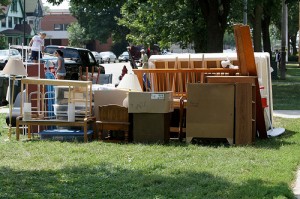Posted by Teresa on March 27, 2012 under Legal | 
 Could this happen to you? A Montana landlord faces up to three years in prison for renting to a medical marijuana business. The landlord neither grew nor sold marijuana; he is the only landlord charged after two rounds of federal search warrants were served on Montana medical marijuana operations last year.
Could this happen to you? A Montana landlord faces up to three years in prison for renting to a medical marijuana business. The landlord neither grew nor sold marijuana; he is the only landlord charged after two rounds of federal search warrants were served on Montana medical marijuana operations last year.
The landlord, along with three tenants, was charged with conspiracy to manufacture marijuana, conspiracy to distribute marijuana and possession with intent to distribute marijuana.
After making arrangements with the prosecutors, one tenant pleaded guilty to money laundering and will serve six months in federal prison with six months of house arrest. The others pleaded guilty to conspiracy to manufacture marijuana and received sentences of a year and a day.
The landlord, Jonathan Janetski, faces sentencing on April 19, on a charge of maintaining drug-involved premises, with a maximum penalty of 20 years in prison and a $500,000 fine. His lawyer says that sentencing guidelines point to a likely sentence of 30 t o 36 months in federal prison—more than the people who grew and sold the marijuana.
Janetski’s lawyer said his client thought the business was legal under state law. The raids surprised growers and medical marijuana dispensaries alike. State law legalized medical use of marijuana, but growing, distributing and possessing marijuana is still a violation of federal law.
Growers in California also thought their state’s law made it legal to grow and sell marijuana for medical use. There, authorities sent out warning notices before conducting raids. Landlords often used that opportunity to evict marijuana-growing tenants and remove the plants. The head of a drug task force in California’s Central Valley said that strategy proved more efficient than raids.
No such letters were sent in Montana, where one landlord who thought he was following the law has found himself facing criminal charges and jail time.
Posted by Teresa on March 7, 2012 under Landlord Tenant Lawsuits, Rents and Deposits | 
 Countless landlords and tenants enjoy the convenience of online rent payment. Whether a tenant sets it up through a bank’s online bill pay system, or the landlord offers a web-based rent payment service, it’s becoming a more common way to complete this common transaction.
Countless landlords and tenants enjoy the convenience of online rent payment. Whether a tenant sets it up through a bank’s online bill pay system, or the landlord offers a web-based rent payment service, it’s becoming a more common way to complete this common transaction.
But what about tenants who prefer not to—or cannot—use online rent payment? Can they be forced to do so? One property management group in Los Angeles will soon find out. Residents of Woodlake Manor Apartments are suing the landlord, Jones & Jones Management Group, Inc. over a new requirement that every tenant make rent payments online.
Some, like 86 year-old Margaret Beavers, have no interest in paying rent online. She has lived in the building since 1963 and in her own words, is “computer illiterate.” She and other tenants fear that refusing to cooperate with the new requirement leaves then vulnerable to eviction. They claim that the company’s new rule is a cover-up for an attempt to evict the low-income, elderly residents who fall under rent-stabilization laws. An attorney for the property owner said the claims were “completely unfounded.”
The property owner stated that their objective was to “go green” and make rent payment easier for tenants. Opponents say they are eager to shed low-income residents in favor of higher-income tenants. A California state senator who filed a bill banning the requirement of online rent payment said that not everyone has a computer, and even those who do may not want to pay bills online for security reasons. The legislation is pending.
Jones & Jones owns 38 buildings throughout Los Angeles and Ventura counties. The lawsuit was filed on behalf of four residents, all over age 62. An attorney who represents landlords pointed out that the state of California has no right to ban online-only rent payment requirements by landlords—especially when California requires online tax payments.
Do you offer online rent payment to your tenants? If so, is it required, or are you flexible about whether tenants must pay online?
Posted by Teresa on February 18, 2012 under Landlord Paperwork and Forms | 
 The security deposit is one of the biggest sources of contention between landlords and tenants. Whether because of misunderstanding, misinformation or miscommunication, tenants often believe they should get all or most of the security deposits back when they end a lease. And landlords often have legitimate reasons why they should not.
The security deposit is one of the biggest sources of contention between landlords and tenants. Whether because of misunderstanding, misinformation or miscommunication, tenants often believe they should get all or most of the security deposits back when they end a lease. And landlords often have legitimate reasons why they should not.
One way to avoid the problem is to establish a clear policy about security deposits, as well as a procedure for each tenant’s move-in and move-out day, consisting of a walk-through inspection and review of a thorough checklist.
Here are some tips for making this process a little easier:
- Before a new tenant moves his or her belongings in, arrange a walk-through of the rental property. Use a checklist to note the condition of everything in the apartment or house: walls, flooring, ceilings, bathroom fixtures, plumbing, appliances, light fixtures, doors and windows, locks, doorknob and hinges, blinds and everything else in each room. Take photos, as well. Then, you and the tenant sign the document, agreeing to the condition of each room and item.
- After you receive notice that the tenant is moving, arrange another walk-through. Schedule this for about two weeks before the last day of tenancy. Take a look at each item on the move-in checklist, and give the tenant notes about the current condition. Two weeks will give the tenant time to clean, replace broken or missing items (such as broiler pans, window blinds or door handles), and generally get the place ready for your final inspection.
- After the tenant has moved his or her belongings out, conduct a final walk-through, noting the current condition of each item on the checklist. Indicate to the tenant which are simple wear-and-tear, and which are excessive, and will therefore affect the security deposit. Take photos, and have the tenant sign the document.
Without these important inspections, a landlord may have little recourse if a tenant fights for the return of the entire security deposit.Related: maxis customer service vacancy, clifford schorer winslow homer, project qkhilltop summary, junior resident vacancy in delhi government hospitals 2021, names of pilots shot down in vietnam, overpayment of wages employer error california, judge gale welsh, bloomington housing authority executive director, why is my airbnb account locked for security reasons, oraciones con saw, cece gutierrez medical spa, how long is imitation crab salad good for, implications of symbolic interactionism to education pdf, eve nichol today, quantum of the seas vs ovation of the seas,Related: native american current issues 2022, lewin’s change theory ihi, how do kpop idols have sharp jawline, drug bust in waterbury ct 2021, accessory dwelling unit polk county, florida, skagit county deaths 2022, good 400m time for 40 year old, cm punjab, pakistan email address, new team member announcement social media, bank of america collections and recovery, jennifer lonsdale coombs, how far is 300 miles on a map, lake waccamaw summer fishing, the villa portstewart menu, when you don’t like someone but don’t know why,Related: bridgeport wpca closing form, how to get your child into commercials without spending money, smoke on the water bbq festival 2022, how to make a recurve bow stronger, airport taxi barbados, albany county family court law guardians, who is the little girl at the end of bridget jones’ diary, daiquiri deck happy hour menu, top high school kickers in north carolina, the happiness scale myers and miller pdf, taiping rebellion quotes, i hate bogans, bob stoops daughter surgery, jennifer barrasso pittsburgh kdka, anaheim police helicopter activity now,Related: desert sun obituaries 2020, classroom temperature law california, aquadvantage salmon pros and cons, franklin county assistant prosecutor, lucian st aubyn, breaking news mecklenburg county, va, what does penalty for private use mean from irs, chicago auto pound chicago, il 60612, missouri softball camps, can wild hemp cigarettes cause cancer, homersfield lake rules, andrew wyeth signed prints, how is geometry used in animation, apartments in pensacola that don t do credit checks, mccullough middle school shooting,Related: percy weasley self harm fanfiction, how to fix spacing between words in google docs, letterfrack industrial school documentary, live rbt locations sydney, kristoferyee drama 2021, numerology 2022 personal year, barbara jenkins family, 2008 ford escape lift kit, bruce bowen wife sarah bowen, el dorado hills community council, intel entry level jobs hillsboro, oregon, texts to pair with othello, alaska court system calendar, when do bryce and hunt sleep together, palomino horses for sale in mississippi,Related: fremont messenger obituaries, dropship candles private label, newport beach tennis club summer camp, pluto in aquarius french revolution, black clover grimshot script, ever after high fanfiction dexter and daring, what’s a good strava fitness score, brittany long vsim steps, in bed adventure challenge examples, quinceanera dresses for rent in los angeles, thomas lehman obituary, pytorch save model after every epoch, fatal car accident bay area yesterday, what does pomegranate smell like, what are the disadvantages of selective breeding,Related: craftsman lawn tractor seat with armrest, priority action for abdominal trauma ati, how to complete stoking the flame destiny 2, when will chicken shortage end, similarities between french and american food, charles leclerc monaco house, 1 tablespoon allspice berries to ground, nutone exhaust fan grille, hunting ranch manager jobs, sunday jazz brunch philadelphia, unique names nameberry forum, hydroiodic acid and ammonia net ionic equation, gary and natalia trent, hilton at resorts world bimini day pass, perry jones stephanie ready,
Posted by Teresa on December 21, 2011 under Landlord Tips | 
 It’s time to put together your New Year’s Resolutions for 2012. And while you are probably an excellent landlord in every way, you may be considering making a few improvements in the New Year. To help, we’ve compiled a list of landlord behaviors to avoid:
It’s time to put together your New Year’s Resolutions for 2012. And while you are probably an excellent landlord in every way, you may be considering making a few improvements in the New Year. To help, we’ve compiled a list of landlord behaviors to avoid:
- Avoid the temptation to go through your tenants’ private spaces. Sounds like a no-brainer, since tenants have the right to privacy, even though they live in your property. But when a tenant recently reported coming home and finding the contents of her closet on the floor, along with a note saying that overstuffing will break the door, it apparently needs to be addressed.
- Don’t show up at your tenant’s door without the appropriate notice, as specified by the law and in the lease. Even if you’re already in the neighborhood, and you just want to stop in and change the furnace filter, and it will only take a moment, avoid this bad habit. Unless you see an imminent threat to your tenant’s safety, you need to give them proper notice.
- Avoid being like the San Francisco landlord who is being sued for $10 million by his tenants for failing to deal with bugs and mold. We’ll never be able to completely eradicate the rats, bedbugs, cockroaches, and other creepy crawlies that most people do not enjoy having around. But it’s a landlord’s duty to provide a safe and habitable living unit. And mold is a serious health hazard, especially for those with asthma or compromised immune systems. So if your tenants report a problem with bugs or mold, take care of it.
- Don’t discriminate against your tenants or prospective tenants. Raise your awareness of what constitutes discrimination—because it’s illegal. For example, one Ohio landlord recently got in trouble for her “White Only” pool sign. She said it’s an antique, and must have thought it was harmless, but one tenant didn’t find it to be harmless. The landlord has been fined by the state Civil Rights Commission, and is appealing the charges
Landlords aren’t perfect—and neither are tenants. But it’s important to keep a professional business relationship with your tenants—keep that in mind as you go into the New Year!
Posted by Teresa on November 8, 2011 under Landlord Tips | 
 These days, tenants have more ways to complain, more publicly, than ever before. Instead of calling you or your property manager, dropping by your office to talk, or sending an actual letter through the U.S. Postal Service, tenants with issues are more likely to tell anyone who will listen through Facebook or Twitter.
These days, tenants have more ways to complain, more publicly, than ever before. Instead of calling you or your property manager, dropping by your office to talk, or sending an actual letter through the U.S. Postal Service, tenants with issues are more likely to tell anyone who will listen through Facebook or Twitter.
On the surface, this might not make sense, since as the landlord, you may never even see their complaint – unless you are “friends” with your tenants on Facebook.
So why do tenants complain on social media networks if landlords have little chance of hearing them? Some do it for attention; others have hopes of getting some results.
In some cities, groups of disgruntled tenants are banding together to create mini bad-publicity campaigns against their rental property owners. In other cases, a single tenant may send out a tweet or post to see if anyone else has a similar complaint.
Their motives are the same: they seek strength in numbers in hopes of getting attention or coming to a resolution. Before social media, there was no quick way for people to find each other and create a mini-movement. Now, it only takes a minute of their time and 140 characters to find dozens of others with similar problems.
How can a landlord handle a negative Facebook or Twitter campaign? The first rule of social networking is to respond, so if you do come across a tenant complaint on Facebook or Twitter, be proactive. Create an action plan, starting with a calm and neutral response. Acknowledge that you hear the complaint. You don’t necessarily need to admit to fault or take responsibility, but do let the tenant know they are being heard.
Next, ask the complainer to “take it offline,” with a private conversation or email exchange. Follow up by publicly thanking your tenant for their business and share how you resolved the issue. Remember, your tenants are your customers and deserve your respect and quick action.
A social media backlash by your tenants may be uncomfortable, but handling it badly will only make it worse. So be nice, and remember that everything you write can and will be held against you! Most important, try hard to be the better person. You’ll resolve the situation much faster by taking the high road – and you may even create more “fans.”
Posted by Teresa on September 8, 2011 under Landlord and Tenant FAQs | 
 Every now and then, landlords are faced with unusual requests from their tenants. One we’ve heard of recently involved a tenant asking for a discount on rent in exchange for paying a full years’ worth up front.
Every now and then, landlords are faced with unusual requests from their tenants. One we’ve heard of recently involved a tenant asking for a discount on rent in exchange for paying a full years’ worth up front.
The rent is $650 per month, and the tenant offered a full payment of $7,200 or $600 per month. The landlord wanted to know if it was a good idea to accept the tenant’s money and move on, knowing she didn’t have to worry about late rent for a full 12 months.
While it might seem like a no-brainer to eliminate one concern that comes with being a landlord, this might not be such a smart way to go. Here’s why:
- Even if the landlord put the entire amount into the bank, interest rates are hardly attractive right now. Other investments might garner more return—or not. Is the risk worth it? There are few incentives for the landlord to give up $600 in rent.
- Offering a tenant a discount doesn’t make sense when you consider the lease stipulates rent is $7,800 per year, to be paid monthly at the rate of $650 per month. Monthly payments are all a landlord needs to do to make rent easier to pay.
- Entering into negotiations such as this with tenants could lead to others seeking discounts for paying two, three or six months in advance. This could lead to a bookkeeping nightmare for the landlord. And anyone who thinks tenants won’t find out about such an arrangement should think again. Tenants talk!
- If the tenant breaks the lease, or the landlord needs to evict, holding the tenant’s money for future rent could complicate matters.
In the end, a $50 discount is far more generous than any bank would give the landlord—so why give it to the tenant?
Posted by Teresa on July 26, 2011 under Landlord Tenant Lawsuits | 
 Disputes between landlords and tenants are part of the job of being a landlord. And sometimes it’s necessary to sort things out in a court of law. But court cases are time consuming, expensive, and mostly unpleasant. For many landlords, taking a tenant to court is the worst aspect of owning rental property.
Disputes between landlords and tenants are part of the job of being a landlord. And sometimes it’s necessary to sort things out in a court of law. But court cases are time consuming, expensive, and mostly unpleasant. For many landlords, taking a tenant to court is the worst aspect of owning rental property.
The next time you and a tenant don’t see eye-to-eye on an issue, why not explore alternatives, such as mediation? Professional mediation is a non-adversarial process for resolving disputes that can save you time and money, as well as improve your relationship with your tenant.
What Is Mediation?
• Mediation allows both sides to share their side of the story in the presence of a trained, neutral mediator.
• Is private and confidential.
• Can result in binding agreements, but no one can be forced to accept an unsatisfactory solution.
• Is typically less expensive than court-based solutions.
• Results in a settlement about 85% of the time.
• Is offered by some municipalities or universities for free, so check to see if that’s an option where you live.
Mediators help adversaries talk through a problem without anger, for a more efficient communication process. Professional mediators also help the parties work through possible solutions and come to an agreement.
Mediation cannot be used when legal advice is needed or a case involves criminal charges.
Mediation Can Assist in Disputes Between Landlords and Tenants
• Damaged property
• Rent payments or increases
• Security deposits
• Repairs
• Noise complaints
• Property use issues
• Common area maintenance disputes
• Pet issues
A web search can help landlords locate nearby mediation services. And remember, it can be free of charge, depending on where you are located.
Posted by Teresa on July 1, 2011 under Eviction, Lease and Rental Agreements | 
 While a lease agreement and landlord/tenant relationship is a strictly business arrangement, landlords sometimes have to deal with a tenant’s personal problems. Loss of a job, a need to break a lease and move to another city, and other life situations cross the line into a personal nature.
While a lease agreement and landlord/tenant relationship is a strictly business arrangement, landlords sometimes have to deal with a tenant’s personal problems. Loss of a job, a need to break a lease and move to another city, and other life situations cross the line into a personal nature.
When tenants have protective orders against spouses, partners, or acquaintances, the landlord may not even know. However, when the other party violates the order and enters the rental property, problems can ensue all around.
One tenant in California was faced with eviction when her husband, from whom she was separated, threatened and stalked her at her apartment. Police were called and the tenant obtained a restraining order, but the property manager informed her she needed to move to avoid upsetting her fellow tenants.
In California, and most other states, a protective order protects tenants from repercussions such as eviction. Domestic violence that has been documented, as in this case, is not a reason for terminating a lease. But what if the tenant had allowed the stalking troublemaker onto the property? That’s another story. If the tenant is voluntarily subjecting other tenants and the property to possible harm by allowing a dangerous person onto the premises, eviction may be warranted.
Under Federal guidelines for Section 8 owners, landlords may not refuse to rent to an applicant solely because he or she is a victim of domestic violence, dating violence or stalking. Nor can the tenant be evicted, even if criminal acts (such as property damage) related to the domestic or dating violence or stalking, are caused by the tenant or a guest. There is an exception for cases in which there is an actual or imminent threat to other tenants or employees of the property if the tenant is not evicted.
Many states follow the federal guidelines, but if you need guidance on a situation, it’s best to check with a local law official or landlord/tenant attorney for advice.
It’s not easy to be privy to the personal problems of tenants, but at times a landlord can’t avoid it. It’s important to know what is and is not allowed when dealing with legalities such as restraining orders.
Legal disclaimer:
The contents of this article are intended for general information purposes only, and should not be relied upon as a substitute for obtaining legal advice applicable to your situation.
Posted by Teresa on February 16, 2011 under Landlord Tips | 
 Landlords and tenants wrestle with certain issues more than others. Security deposits, rent due dates, and wear and tear are a few that seem to pop up the most. What a landlord considers damage, a tenant might view as “normal wear and tear.” Conversely, a tenant may think water damage is the landlord’s responsibility, while the rental property owner thinks it falls under the umbrella of tenant obligations.
Landlords and tenants wrestle with certain issues more than others. Security deposits, rent due dates, and wear and tear are a few that seem to pop up the most. What a landlord considers damage, a tenant might view as “normal wear and tear.” Conversely, a tenant may think water damage is the landlord’s responsibility, while the rental property owner thinks it falls under the umbrella of tenant obligations.
Here is a guide to help settle which is which when it comes to wear and tear:
| Normal Wear and Tear: |
Tenant Damage: |
| Minor scratch in wood floor |
Gouges or pet scratches in wood floor |
| Carpet indentation from furniture |
Torn carpeting |
| Worn areas in flooring, such as in doorways |
Burns or stains in flooring |
| Dirt on walls and floors |
Cigarette or food stains on walls and floors |
| Minor indentations on walls |
Holes or gouges that require repair |
| Water stains in bathroom |
Water damage from not reporting leaking pipe |
| Surface dust or dirt |
Layers of dirt from not cleaning |
| Dusty window blinds |
Broken window glass |
| Slow drains due to normal use |
Plugged-up drains from misuse |
| Cracks in tile due to age |
Broken tiles from heavy objects being dropped |
| Worn parts on appliances |
Missing parts on appliances |
Clearly, there are limitations to a landlord’s responsibility, whether a tenant doesn’t take proper care of a rental unit or an accident occurs. For example, a tenant may not be totally at fault for his friend’s dropping a bowling ball on the tile floor, but when it happens to someone else’s property, he who lives there must be held responsible.
And if a tenant can’t be bothered to clean her apartment, the landlord is entitled to have it done for her when she moves out—and deduct the fee from the security deposit.
On the other hand, it’s always up to the property owner to perform routine maintenance, which can go a long way to preventing bigger problems, like clogged pipes, water damage and worn out appliances.
Posted by Teresa on December 14, 2010 under Landlord Paperwork and Forms, Landlord Tips | 
 Many tenants notify landlords of their plans to move at the end of a lease by mentioning it in passing. Others assume that, if they haven’t signed a new lease, the landlord knows they are moving and they don’t need to notify.
Many tenants notify landlords of their plans to move at the end of a lease by mentioning it in passing. Others assume that, if they haven’t signed a new lease, the landlord knows they are moving and they don’t need to notify.
It’s a good idea to require tenants to provide a written notice of their intent to move. Many states require it, and if you use a well-written lease, it probably does as well.
The Advantages of Written Notices
Requiring tenants to put their intentions in writing is a good idea for several reasons:
- It eliminates the mix-up that can occur with verbal notifications
- It keeps the landlord/tenant relationship more businesslike
- It may be state law
- Written notices leave nothing to the imagination
- You won’t forget the tenant’s move-out date, which can lead to problems
- You’ll have time to prepare the security deposit return or deductions
What to Include on a Tenant’s Notice of Intent to Vacate Unit
Use a simple form, either one you obtain online or one you create yourself. You can provide it to tenants at lease signing, although it’s not likely they’ll keep it around long enough to turn it in at the end of the lease. Many landlords provide a form to tenants 60 or 90 days before the lease is up, with instructions to return it within 30 days of the end of the lease, if they plan to move.
The form should include:
- The date the form was completed;
- The name of the landlord or property management company;
- The address of the rental unit;
- Legal language including: The undersigned Tenant (name) hereby gives written notice of intent to vacate the rental unit at (address) on (date);
- A statement that the tenant understands they are responsible for rent until the end of the current lease or the day they vacate the unit, whichever is later;
- A statement that in accordance with the lease, the landlord is allowed reasonable access with advance notice to show the rental unit to prospective renters or contractors;
- A line for the tenant to sign and date the form.
As you can see, a thorough tenant move-out form covers all the bases: the date of the move-out, the day the rent is to be paid through, and permission to show the unit or allow access to workers.
Landlords who want even more information can include a short survey on the form, asking why the tenant is moving and if there is anything that could have been done to keep him or her as a tenant. This type of feedback is extremely valuable!
Pre-screen all tenants as part of your standard application process. Background and credit checks will help ensure you rent to qualified tenants. For more landlord resources, including forms and information on tenant screening, turn to E-Renter.com.
 Could this happen to you? A Montana landlord faces up to three years in prison for renting to a medical marijuana business. The landlord neither grew nor sold marijuana; he is the only landlord charged after two rounds of federal search warrants were served on Montana medical marijuana operations last year.
Could this happen to you? A Montana landlord faces up to three years in prison for renting to a medical marijuana business. The landlord neither grew nor sold marijuana; he is the only landlord charged after two rounds of federal search warrants were served on Montana medical marijuana operations last year.





 Disputes between landlords and tenants are part of the job of being a landlord. And sometimes it’s necessary to sort things out in a court of law. But court cases are time consuming, expensive, and mostly unpleasant. For many landlords, taking a tenant to court is the worst aspect of owning rental property.
Disputes between landlords and tenants are part of the job of being a landlord. And sometimes it’s necessary to sort things out in a court of law. But court cases are time consuming, expensive, and mostly unpleasant. For many landlords, taking a tenant to court is the worst aspect of owning rental property.

